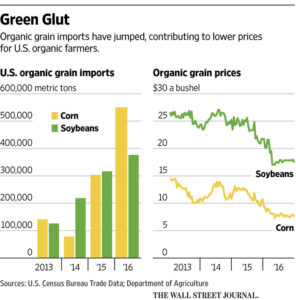Jacob Bunge reported on Tuesday at The Wall Street Journal Online that, “Organic grain is flooding into the U.S., depressing prices and drawing complaints from domestic organic farmers who fear their harvests are held to stricter standards than foreign-raised crops.
“Turkey, for instance, vaulted ahead to become by far the biggest supplier of organic corn and soybeans to the U.S. last year. The Mediterranean country in 2016 shipped to the U.S. 400,000 metric tons of organic corn, nearly quadrupling its prior-year total, while its soybean shipments climbed by more than eight times, U.S. Agriculture Department data show. Other key suppliers to U.S. organic-food companies are now Ukraine, Argentina, Romania and India.”
Mr. Bunge explained that, “U.S. organic-farming groups say that influx of foreign grain has been a chief factor in slashing prices for organic corn by about 30% in 2016, along with a 20% decline for organic soybeans. Those declines came despite robust growth in U.S. sales of organic foods—and far underperformed prices for nonorganic corn and soybeans. USDA-certified organic food sales in 2016 climbed 10% to $12.3 billion, versus a 0.7% increase in conventional grocery sales, according to Spins LLC. Those figures don’t include sales from Whole Foods Market Inc., a major organic retailer.
“Some organic farmers in the U.S. contend that overseas organic farms benefit from looser oversight, giving them an edge over domestic farms. They point to past failures among foreign-based organic operations in following U.S. organic standards, and occasional cases of fraud. Now U.S. groups want U.S. authorities to step up scrutiny of organic operations in Turkey and other Eastern European countries, and provide more support for U.S. organic farmers.”

Graph from The Wall Street Journal.
The Journal article added that, “Typically, farmers shifting to organic have to sell their crops at lower, conventional prices during that changeover period, which takes about three years. U.S. organic farmers say that competing against cheap imports has diminished the payoff from a tougher method of raising crops.
“Michael Konen, who raises organic corn, soybeans and wheat on 150 acres near Sugar Grove, Ill., said that when he converted to organic farming eight years ago he was getting $11 to $16 per bushel more for his organic corn versus conventional varieties. Over the past two years, he said, that premium has shrunk to about $4 to $8, though his costs haven’t changed.”
In conclusion, the Journal article pointed out that, “Lynn Clarkson, president of Illinois-based Clarkson Grain Co., which deals in organic crops that are raised domestically and overseas, said that organic food’s reputation relies on strict enforcement of farming standards. ‘The biggest threat to organic is the loss of credibility,’ he said.”

